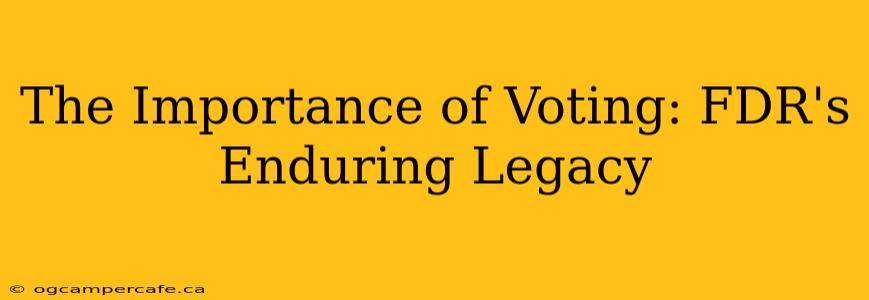Franklin Delano Roosevelt's presidency (1933-1945) profoundly shaped American political culture and continues to resonate today. Beyond his landmark New Deal programs, FDR's legacy underscores the critical importance of voting and active civic participation. His own rise to power, coupled with the challenges he faced, provides a compelling case study for understanding why every vote matters.
Why is Voting Important?
Voting is the cornerstone of a democratic society. It's the mechanism through which citizens choose their representatives, influencing policy decisions that affect their lives, communities, and the nation as a whole. The right to vote, hard-won throughout history, is a fundamental human right that empowers individuals to shape their future. Without active participation through voting, the democratic process weakens, leaving the power concentrated in the hands of a few.
What were some of FDR's accomplishments that highlight the importance of voting?
FDR's presidency stands as a testament to the power of collective action and the influence of a strong electorate. His administration, driven by the urgent needs of the Great Depression, implemented sweeping reforms designed to alleviate suffering and restore economic stability. The New Deal, a collection of programs and policies, encompassed initiatives such as Social Security, the Civilian Conservation Corps (CCC), and the Works Progress Administration (WPA). These were direct results of a populace actively engaged in choosing leaders who would address their concerns. The widespread support for these programs, which were largely the product of intense public debate and advocacy, demonstrated how voting could shape a nation's path.
How did FDR's election demonstrate the power of the vote?
FDR's own election in 1932 exemplified the power of the vote. Facing a nation crippled by economic hardship, he offered a bold vision of government intervention and social reform. His landslide victory was a direct response to the widespread dissatisfaction with the existing administration's handling of the Great Depression. This resounding mandate legitimized his ambitious agenda and empowered him to push through significant policy changes, changes that would have been unimaginable without the active engagement of the electorate. The sheer volume of voters who elected him shows the direct impact that individual participation can have.
What challenges did FDR face that highlight the importance of continued voter engagement?
Even with a strong mandate, FDR faced significant opposition. The Supreme Court initially challenged some aspects of the New Deal, and political battles raged throughout his presidency. His efforts to expand the court, though ultimately unsuccessful, highlighted the ongoing need for vigilance and active participation in the political process. The continual engagement of voters is crucial for holding elected officials accountable, even those initially enjoying broad popular support. Continued engagement is necessary to safeguard the democratic ideals that were, in part, secured by the changes that the FDR administration implemented.
What is the impact of low voter turnout?
Low voter turnout undermines the legitimacy of elected officials and weakens the democratic process. It allows the voices of fewer citizens to dominate policy decisions, often disproportionately favoring specific interests. This can lead to policies that fail to represent the needs and aspirations of a significant portion of the population. FDR's presidency serves as a counterpoint: high voter turnout, driven by a deep sense of urgency and a desire for change, propelled his ambitious agenda forward.
How can we encourage greater voter participation?
Increasing voter participation requires a multi-pronged approach. Improving voter registration processes, enhancing accessibility for all citizens, promoting civic education, and fostering a culture of informed political engagement are all critical steps. The legacy of FDR, a president who understood the power of the collective voice, serves as a reminder that the strength of democracy lies in the active participation of its citizens.
Author's Note: This article explores the enduring legacy of FDR and its relevance to the importance of voting. The author believes that understanding historical context strengthens our commitment to active civic participation in modern democracy.
